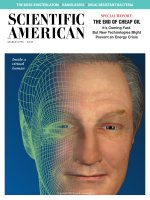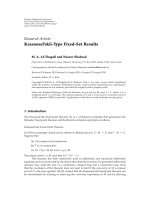Organ systems OS set 03 musculoskeletal a question
Bạn đang xem bản rút gọn của tài liệu. Xem và tải ngay bản đầy đủ của tài liệu tại đây (88.7 KB, 3 trang )
High Yield Warm-up Questions: Musculoskeletal and Connective Tissue, Part A
ORGAN SYSTEMS SET 3: MUSCULOSKELETAL AND CONNECTIVE TISSUE, PART A
1.
Name the five epidermal cell layers typically found in thick skin.
2.
Name the cytoskeletal elements that are associated with the zonula occludens, zonula adherens, desmosome,
hemidesmosome and gap junction.
3.
Pemphigus and pemphigoid are autoimmune blistering conditions generated against adhesive molecules of
which two junctions?
4.
Beginning at the Z line of a sarcomere, list in order the correct bands or zones found as one moves toward the
middle of the sarcomere.
5.
Which functions will be lost when the lumbricals or the interosseous muscles are paralyzed?
1
High Yield Warm-up Questions: Musculoskeletal and Connective Tissue, Part A
6.
Name the four rotator cuff muscles, name the one that is not a rotator and name the one that is the most
frequently torn rotator cuff tendon.
7.
Name the two collateral ligaments, two menisci and the two cruciate ligaments that help stabilize the knee
joint.
8.
Which three knee structures form the “terrible triad” of most frequently injured knee structures?
9.
A teenage basketball player falls and injures his knee. Examination reveals excessive anterior displacement of
the tibia relative to a fixed femur. What knee structure was most likely injured?
10. What class of drug is considered first-line for the treatment of osteoporosis?
11. What advice is given to patients concerning each dose of alendronate?
2
High Yield Warm-up Questions: Musculoskeletal and Connective Tissue, Part A
12. Name the branching components of the brachial plexus in order from the roots of the plexus to the terminal
nerves.
13. Name four brachial plexus nerves commonly compressed by different humeral fractures.
14. The upper trunk of the plexus is stretched during labor and delivery. Name three nerves that contain the same
cord segments as those in the upper trunk that will be affected by the injury.
These question sets are intended to be completed before viewing the High Yield course lectures.
Video explanations can be found on the Warm-up Questions page within the online High Yield course.
For further review of the topics covered in this set, refer to the following lectures:
Musculoskeletal and Connective Tissue:
• Dermatology
• Anatomy and Physiology of Muscles and Ligaments
• Innervation of the Extremities
• Disorders of the Bones
3









